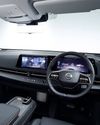New methods are required for efficiently achieving the development goals of future powertrains. APL describes the use of new tools based on genetic algorithms for the targeted parameter optimisation and analysis of large amounts of data using syntactic and statistical pattern recognition. New processor and memory technologies increase the analysis performance of complex calculations and simulations and efficiently support the calibration process. ECU calibrations can already be prepared in offline applications as part of SiL (Software-in the-Loop) studies and thus reduce the effort on the test bench or in the vehicle.

REQUIREMENTS FOR THE CALIBRATION OF POWERTRAINS
In addition to the WLTP test cycle (Worldwide harmonized Light vehicles Test Procedure), with the introduction of the Euro 6d-temp legislation, the real driving emissions according to the RDE (Real Driving Emissions) test procedure must also be met for the homologation of new vehicle types. As reported in [1], APL has developed a general development approach to meet the challenges of WLTP and RDE in powertrain development. In addition to the consideration of extended engine map ranges with regard to speed and load, the emission calibration of powertrains with a conventional internal combustion engine must also take into account the influence of transient phases and dynamic effects. As part of the vehicle and driveability calibration, the torque structure, the engine-transmission interaction and the resulting load point shifts must then also be used to optimise emissions.
In an RDE-optimised development process, the goal is to provide a first proof of emissions for various variants and hybrid derivatives of a powertrain family already at the completion of the predevelopment phase, 1. The incorporation of the engine and powertrain test benches into a real-time vehicle simulation environment to model the vehicle, driver influence and environmental boundary conditions ensures a time-optimised measurement and calibration process with very good reproducibility and allows assessment of powertrain variability, such as vehicle inertia and dynamic gradients. Combined with high-resolution exhaust gas measurement technology, as well as mass and particle spectrometers, the engine behaviour and functional relationships can be described during dynamic driving cycles. This can be supplemented with optical investigations in the combustion chamber to analyse phenomena within individual work cycles [2, 3].
This story is from the {{IssueName}} edition of {{MagazineName}}.
Start your 7-day Magzter GOLD free trial to access thousands of curated premium stories, and 9,000+ magazines and newspapers.
Already a subscriber ? Sign In
This story is from the {{IssueName}} edition of {{MagazineName}}.
Start your 7-day Magzter GOLD free trial to access thousands of curated premium stories, and 9,000+ magazines and newspapers.
Already a subscriber? Sign In

Sound Generation For Enhanced Road Safety
With an ever-increasing number of fully electric and hybrid vehicles entering the market, we are witnessing a change in the acoustic experience in and around the car. The silent nature of the electric powertrain means that other road users miss the familiar acoustic cues that warn them of an approaching vehicle. To remedy this situation, Harman is working on various noise management solutions.

OBJECTIVE ASSESSMENT OF THE SAFETY CONTRIBUTION OF TODAY'S AUTOMOTIVE HEADLAMPS
Good lighting makes a major contribution to road safety. In 2011, the International Commission on Illumination (CIE) presented an evaluation system for headlamps that can objectively assess the quality of illumination and glare limitation. New light sources like LEDs and lighting functions (glare-free high beam, partial high beam) have been available for several years, so that an extension of the proven CIE method is necessary, which takes into account, among other things, changed switch-on and service lives of new lighting functions and represents a generally understandable evaluation system. An evaluation system presented in the following by the Technische Uni versität Darmstadt, which was developed by an encompassing expert commission, is intended to provide representative data and enable an objective evaluation of headlamp performance.

RAPIDO RE-INNOVATES TO CATER TO POST COVID-19 LAST MILE CONNECTIVITY
The rapid pace of urbanisation in the country has witnessed cities expanding and subsuming surrounding villages and smaller towns, evolving into Tier II and III cities.

FUNCTIONAL SAFETY STANDARDS TOP PRIORITY FOR FUTURE AUTOMOTIVE DEPLOYMENT
Increasing levels of electronic content in vehicles result in a large amount of software that is required to run the scenes behind the mechanical aspects of a vehicle. Electronic systems in automobiles are part of every section, from the powertrain to comfort and convenience systems as well as all types of safety equipment. This makes electronics and the software running these systems a critical part of the equation for future mobility solutions. In addition, putting standards in place to measure methods of developing, testing and functioning of such electronic systems also becomes highly relevant.

“BYD'S EV STRATEGY TO ENCOMPASS MOST FORMS OF TRANSPORTATION NEEDS IN INDIA”
The country’s electric vehicle (EV) ecosystem is grappling with a plethora of challenges even as it is striving to wriggle itself out of the ‘nascent stage’ tag. In an exclusive chat with Auto Tech Review, Zhang Jie Ketsu, Executive Director, BYD India shares his perspective on the current EV scenario and how the company intends to progress faster in the Indian automotive industry

SAFETY IN ELECTRIC AND AUTONOMOUS CARS – SIMULATION OF COMPLEX CRASH SCENARIOS
Electric and autonomous vehicles allow for novel seating arrangements and packaging strategies, presenting new safety challenges. Physical crash testing must be supplemented with virtual simulation to ensure vehicle safety on shorter development cycles. With its Simcenter Madymo MBS software, Siemens provides improved runtimes and the Active Human model, enabling accurate and rapid occupant safety analysis in complex crash scenarios.

KIA SONET – A MIGHTY OFFERING IN THE COMPACT SUV SEGMENT
It wouldn't be wrong to say that Kia Motors India has taken the Indian market by storm in less than 12 months of its presence in the market.

NISSAN'S NEW DIRECTION: ARIYA ALL-ELECTRIC
Marking a key milestone in Nissan’s transformation strategy, Ariya ticks a lot of boxes highlighting the strengths of the global automotive giant.

BETTER SAFETY WITH EMERGENCY BRAKE ASSIST FOR MOTORCYCLES
Rear-end collisions with a slower vehicle suddenly cutting into the lane and intersection accidents with cross-traffic are among the most frequent motorcycle accident types. Continental is now developing an emergency brake assist, which detects an imminent collision with a vehicle ahead or with an obstacle, warns the rider and supports him during braking

ADAS WILL SERVE AS CATALYST FOR IMPROVED VEHICLE SAFETY
The automotive industry across the globe is increasingly focussing on safety.